In Rwanda, the land of a thousand hills, a village in Kayenzi perches along the top of a ridge, overlooking the valley below. Green hills, dotted with rust-red roofs, disappear into the distance. The land is divided into small farms—about 90 percent of Rwandans depend on subsistence agriculture, growing only enough food to feed their families. Children cluster at communal water taps, filling yellow containers, smiling and waving at passing cars.
It’s hard to imagine that a horrific genocide happened in peaceful places like this, all over the country, in 1994. Over the course of 100 days, from April to July, the Hutu majority—spurred on by the government—systematically slaughtered close to one million Tutsis.
Never Again
“It’s not easy to talk about that period,” says Captain Marie Grace Nyiramana, national co-ordinator for The Salvation Army’s women’s microcredit project in Rwanda, who was 16 at the time. “After the genocide, there were many orphans, many widows. So many houses were destroyed. Fields and crops were burned. People were very hungry.
“Survivors were suffering because of what they had seen—they were traumatized, afraid to meet with others. They didn’t want to work or cultivate their fields, saying, ‘We are ready to die. There is no reason to do anything because we are at the end.’ ”
That September, The Salvation Army sent an emergency relief team to Rwanda. Based in Kayenzi, they distributed emergency supplies, built houses and restored water sources. They also provided spiritual support, and soon a corps was planted.
This is how Captain Nyiramana was introduced to the Army, and also how she met her husband, Andrew Nsengiyaremye, one of the Army’s first recruits. They were married in 1996, and she also became a soldier. In 2002, they were among the first Rwandans to go to training college in Congo-Brazzaville, graduating as part of the Bridgebuilders Session.
“I decided to become an officer because of the compassion I have seen in The Salvation Army,” says Captain Nyiramana. “After being commissioned, it was my priority to build bridges—to teach Rwandan people about reconciliation, to become one people, so that genocide will never again happen in our country.”
In this deeply divided place, The Salvation Army is helping to bring people together, to bring healing. “When you visit the Kigali Genocide Memorial, and understand what happened—it’s tragic,” says Lt-Colonel Seth Appeateng, officer commanding, Rwanda and Burundi Command. “We can’t correct the past, but we hope that we can correct the present, so we won’t repeat our mistakes in the future, and there will be peace.
“In some areas, we have a reconciliation program, where people come to The Salvation Army to learn and share ideas about how to live together as Rwandans. And as leadership, we preach about reconciliation, making sure our people accept and bless each other, whatever their background, so that people see what it looks like.”
Peace and Reconciliation
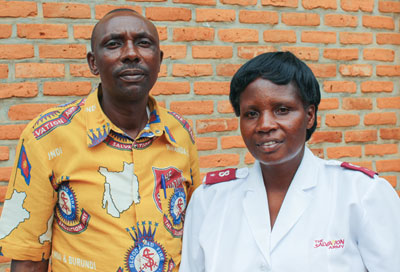 Lts Jean-Damascene Mudenge and Pelagie Mudenge are the corps officers in Kayenzi, where The Salvation Army first started in Rwanda
Lts Jean-Damascene Mudenge and Pelagie Mudenge are the corps officers in Kayenzi, where The Salvation Army first started in Rwanda
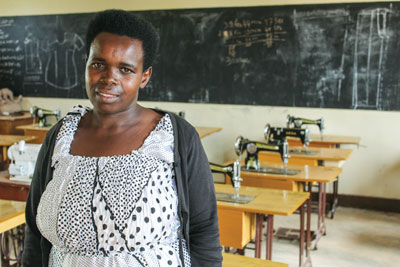 Francine Mukeshimana teaches sewing as part of the TVET (technical, vocational and education training) program in Kayenzi
Francine Mukeshimana teaches sewing as part of the TVET (technical, vocational and education training) program in Kayenzi
In Gituro, children must walk for two hours each way to attend the closest primary school. The Army has been given land and hopes to build a school. The Army supports five preschools in Rwanda, including in Kayenzi, where Lieutenants Jean-Damascene and Pelagie Mudenge are the corps officers. Along with the preschool, they run the TVET (technical, vocational and education training) program.
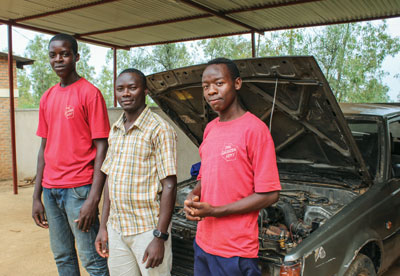 In this area, we started tailoring and auto mechanic classes, because the people of our country need it,” he explains. “Some left school because they couldn’t afford school fees, so they can come here. Learning a skill helps them get a job.”
In this area, we started tailoring and auto mechanic classes, because the people of our country need it,” he explains. “Some left school because they couldn’t afford school fees, so they can come here. Learning a skill helps them get a job.”
Empowering Women
Another way the Army in Rwanda is supporting livelihoods is through microcredit. Groups of 10-15 women meet each week, bringing money to save in a common bank account. After a year, they are able to receive a loan of five times the amount they saved to invest in their businesses. The groups share their experiences and encourage each other to repay the loans, which are due within 12 months.
“The Army is using microcredit to help women develop, to provide for their families,” says Captain Nyiramana. “And that empowers them.”
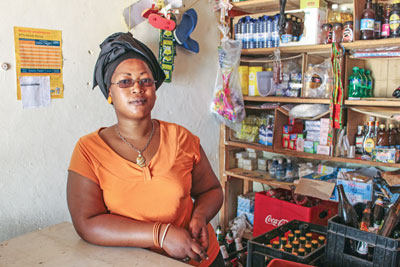 Giselle Umutoni in her shop in Muhanga. Thanks to The Salvation Army, she has hope for the future
Giselle Umutoni in her shop in Muhanga. Thanks to The Salvation Army, she has hope for the future
The loans Esther Nyiramatungo received helped her expand her business selling textiles in the market. “The group has taught me the importance of solidarity, and also about loyalty,” she says. “If we’re not loyal, the group won’t last.”
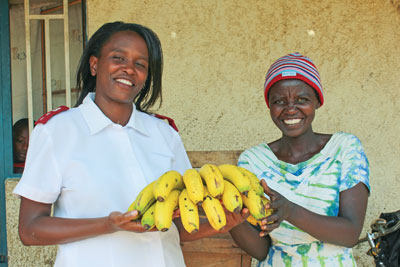 Cpt Nyiramana and Josephine Mukanyandwi, who bought a bicycle and crate with the loan she received from the Army’s microcredit project
Cpt Nyiramana and Josephine Mukanyandwi, who bought a bicycle and crate with the loan she received from the Army’s microcredit project
Mobilizing
While Rwanda is politically stable and is making significant economic progress, poverty remains high. “The demands here are huge, but the resources we have are few—that’s the challenge we face,” says Lt-Colonel Appeateng.
In 2015, with support from external funding, the Army provided access to health care for 3,000 beneficiaries in five districts, paying 80 percent of the insurance premium. They also distributed a two-month supply of food for 180 beneficiaries in Kinigi, Northern Province, and gave out 8,000 buckets in a refugee camp.
A five-year strategic plan (2014-2018) outlines the Army’s priorities to continue meeting community needs, grow as a church, increase and empower officers and become more financially self-sufficient. Despite difficult circumstances, they are committed to mobilizing their resources and finding local, faith-based solutions.
Features editor Giselle Randall travelled to Rwanda in January to see the work of The Salvation Army.
The Red Zone
After the genocide in Rwanda, Salvation Army pioneers brought hope in dangerous times.
By Major Hilary Jackson
On April 6, 1994, a plane carrying Rwandan President Juvenal Habyarimana was shot down over Kigali, triggering a systematic massacre of Tutsis by the Hutu majority, over a period of 100 days. The genocide was brought to an end when the Rwandan Patriotic Front, made up of Tutsi refugees who had fled previous ethnic conflict, invaded from Uganda and seized control of the country. That September, The Salvation Army sent an emergency relief team to help begin the rebuilding process. In June 1998, Canadian officers Majors Fred and Hilary Jackson were appointed to Rwanda as regional commanders, to oversee the Army’s rapidly growing work. Major Hilary Jackson reflects on that time.
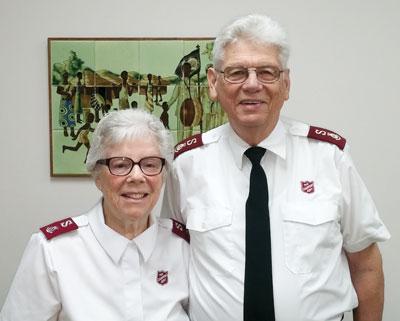 Canadian officers Mjrs Hilary and Fred Jackson were the first regional commanders in Rwanda (Photo: Joyce Hazard)
Canadian officers Mjrs Hilary and Fred Jackson were the first regional commanders in Rwanda (Photo: Joyce Hazard)
Although regional headquarters was located in Kigali, the capital of Rwanda, most of the Army’s work was in Kayenzi Commune, a bone-jarring one-hour drive west, through dangerous terrain. Kayenzi was in a “red zone,” with intermittent fighting between the Rwandan Patriotic Front (RPF) and Hutu rebels. It wasn’t unusual to travel to Kayenzi hearing gunfire echoing through the hills. During one visit, we watched a low-flying helicopter on the next hill shooting into the trees at rebel fighters.
But in spite of the dangers, The Salvation Army grew. In fact, we faced an enviable problem—we couldn’t keep up with the demand for soldiership classes.
In October, the fighting escalated and we were forced to bring our staff and vehicles into the city. The corps officers stayed as long as they could, but the people, concerned for their safety, begged them to leave. The local people carried on, knowing that at any time the compound could be attacked. They were proud to wear their white uniforms identifying them as Salvationists.
December 1998 was a dangerous time. The rebels distributed flyers advising the people that they would attack the area on Christmas Day. The United Nations representative advised us not to go to Kayenzi, but we still had loyal staff and soldiers who were carrying on the work. We decided to go and hold meetings on Sunday, December 23.
The road, usually teaming with people, was eerily abandoned. As we drove into the compound, no one was there to greet us. My heart sank as doubt set in. No one had come. We parked the vehicle and made our way to the building. Even the air seemed to be holding its breath.
When we opened the door, we saw a room full of people sitting and waiting for us. There was no feeling of tension, just a quiet calm. During the genocide, people had run to churches, believing they would be safe—only to be massacred. Everyone knew the danger of meeting, yet they came to worship. We celebrated the birth of Christ, singing together in hushed voices.
Leaving Kayenzi, we made our way to the outpost in Bitari, about 10 kilometres away. The corps leaders, then Envoys Andrew Nsengiyaremye and Marie Grace Nyiramana, were waiting for us in their tiny house with about half a dozen people. We couldn’t stay long. We sang carols and distributed small gifts before setting off for Kigali. My heart was breaking for these brave people.
On December 25, the Roman Catholic compound about five kilometres from Kayenzi was attacked, but not one of our Salvationists was hurt.
In March, plans were made to hold the first congress in Rwanda. The mayor of the district gave us permission to hold a march of witness and open-air meeting over the Easter weekend.
We arranged for taxi buses to transport people from Kigali. During the genocide, these buses were often stopped and people gunned down by the side of the road. Our taxis vibrated with singing and even timbrels playing. We travelled in convoy, passing through the military checkpoints. We arrived to see hundreds of people lined up in single file, ready for the march of witness. How proud we were to stand on the back of the truck, taking the Salvation Army salute.
That weekend, we enrolled 35 soldiers and 10 adherents, and dedicated 25 babies. On our way back to Kigali, we dropped people off at Runda. What we didn’t know until later was that a group in the corps had stayed awake the previous night, praying for the safety of the congress delegates. When we left them after the congress, they didn’t go home, but gathered at the town square to hold an open-air service.
The spirit of the Army was evident and God blessed our pioneer soldiers in amazing ways.
Major Hilary Jackson is a retired Salvation Army officer. She and her husband, Major Fred Jackson, served in a variety of appointments in the Canada and Bermuda Territory, as well as overseas. They attend Cascade Community Church in Abbotsford, B.C.




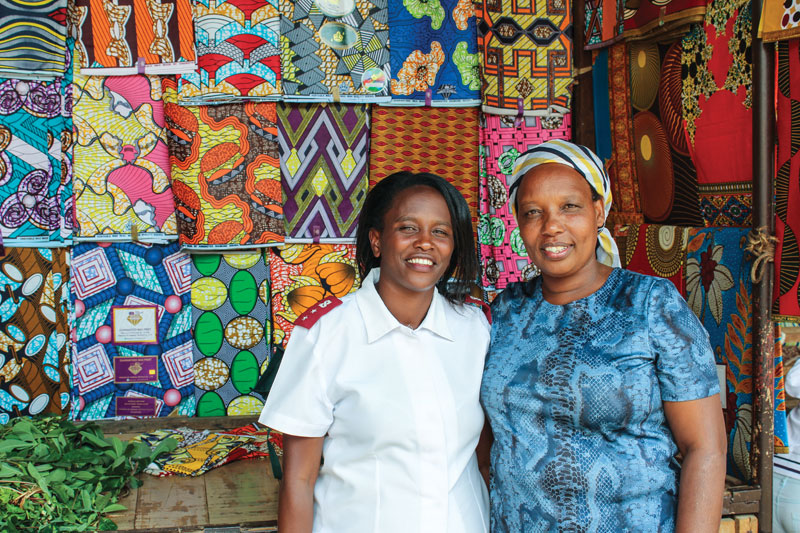
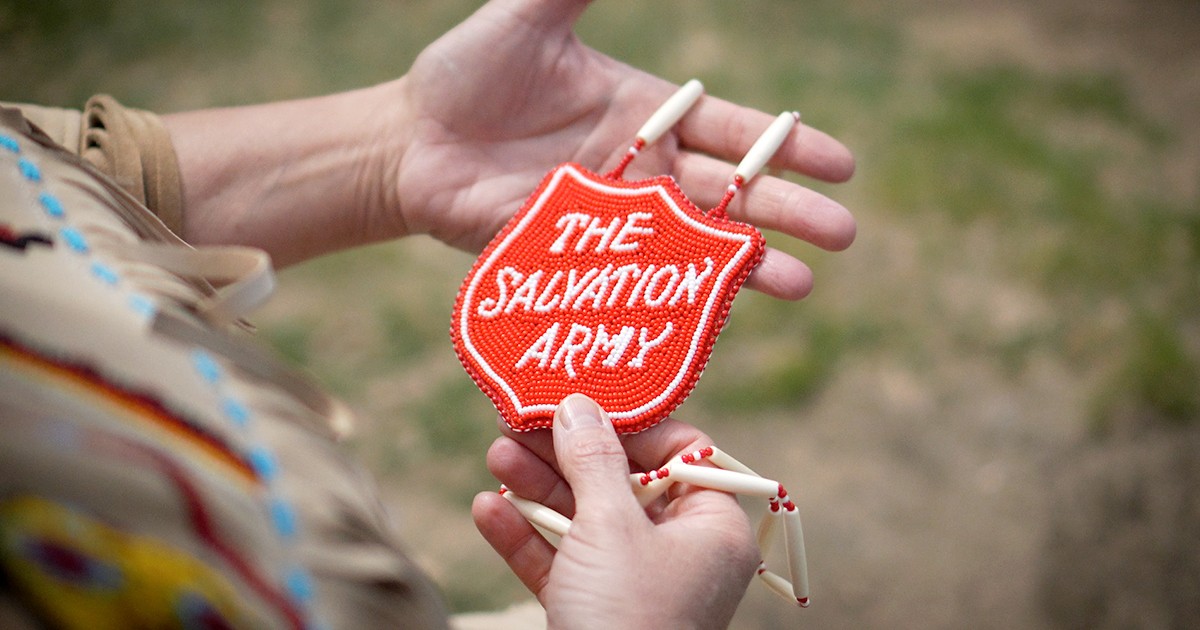
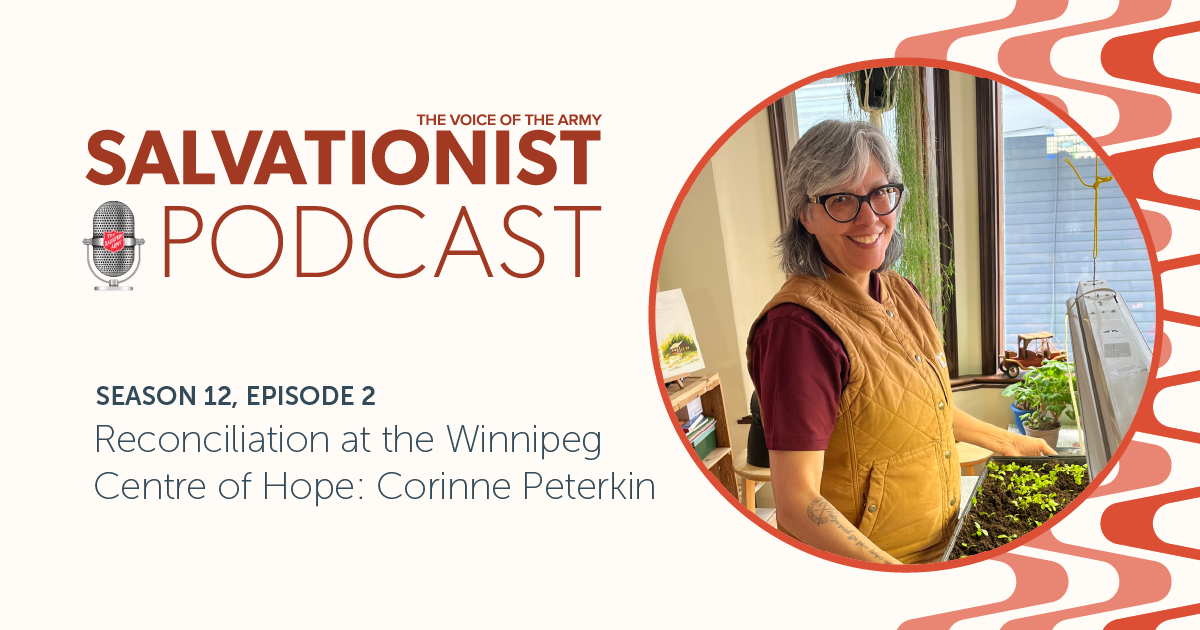
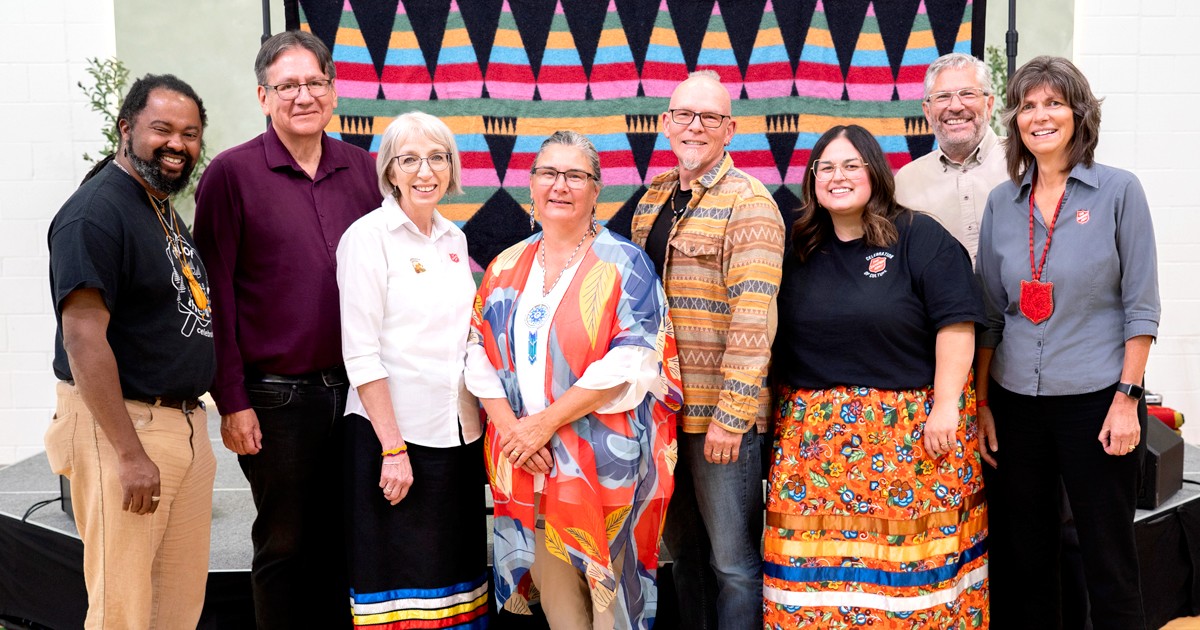


Leave a Comment